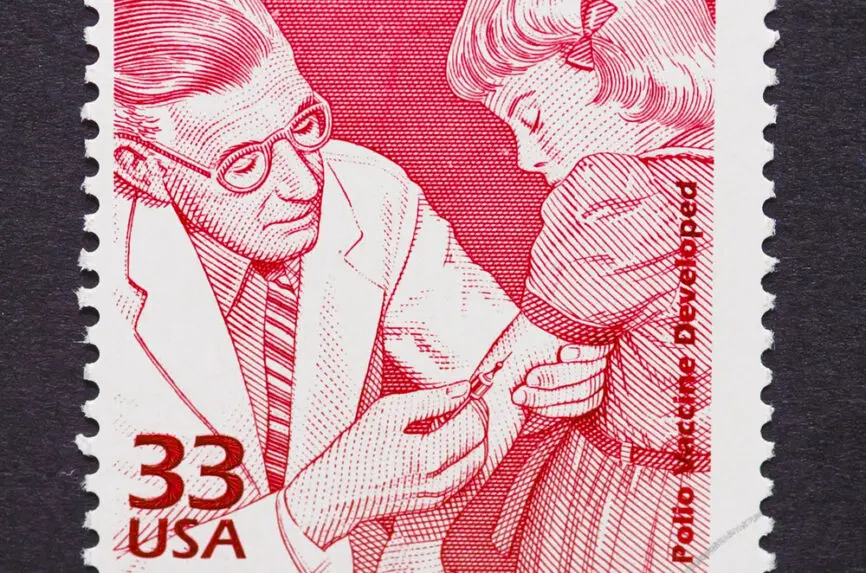Bioethics Forum Essay
The Common Good and the Contagion: Florida’s Un-American Experiment
As a kid, I walked oddly, throwing out my right foot ahead of me. I learned to do this by watching my dad. I was imitating his gait, which was caused by nerve damage from childhood polio.
According to the Centers for Disease Control and Prevention, the Global Polio Eradication Initiative has prevented 20 million cases and approximately 1.5 million deaths since 1988. Many, if not most, of those 20 million people would have had some lifelong disability ranging from gait issues, like my dad’s, to spending their life in an iron long, like Paul Alexander who died in March 2024 after living for 72 years encased inside the breathing chamber. Survivors may face damage years later from viruses that hide in the body such as post-polio syndrome, shingles from the chickenpox virus, and deadly cancers from earlier HPV infection.
My grandfather lost all of his siblings to the 1918 flu pandemic, which the CDC estimates infected 500 million people and killed at least 50 million (675,000 in the United States alone). More people died in that pandemic than on the battlefields of World War I.
In my family, we know why avoiding infectious disease is important, but my father’s home state of Florida has taken a different approach: Florida’s Surgeon General, Joseph Ladapo, has announced his intention to remove all vaccine mandates for children and adults. Such an action would put all people in Florida — especially those who are immunocompromised, elderly, or without immunization protection — at high risk of illness and death from preventable communicable diseases.
For much of human history, communicable disease stirred fear in people. During polio outbreaks, parents would keep their children at home to protect them from infection from public pools and other kids. A World Health Organization study published in The Lancet found that global immunization has saved 154 million lives over the last 50 years with two-thirds of those saved being infants.
Vaccine mandates are as old as the United States. In 1777, George Washington required inoculation (using variolation, in which smallpox scabs or pus were introduced into a person’s body to elicit an immune response) of new recruits in an attempt to guard against smallpox, which had decimated the Continental Army. In 1855, Massachusetts adopted mandatory smallpox vaccination for children; parents who refused faced a $5 fine (about $186 in 2025). A 1905 U.S. Supreme Court case (Jacobson v. Massachusetts) found that the mandate and the fine were Constitutional and that states had the authority to enforce vaccination laws. By 1980, all 50 states and Washington, D.C., required vaccines for children to attend public schools.
A 2025 study in JAMA estimates that falling vaccination rates would lead to an additional 11 million cases of measles over the next 25 years, with 1 million cases of measles in Florida alone. While Florida may be the first state to rollback compulsory vaccination, it is unlikely to be the last.
Those who are vaccine-hesitant offer several reasons: The number of childhood vaccines overwhelms the immune system, vaccines components are dangerous, or certain vaccines cause autism. An Institute of Medicine safety review committee found no negative health impacts from the childhood vaccine schedule. Other reasons for hesitancy are based on the fraudulent (and retracted) work of Andrew Wakefield, who published an article in The Lancet in 1998 claiming to link autism to the measles, mumps, and rubella (MMR) vaccine. Wakefield had several conflicts of interest, and he lost his medical license because he falsified his findings. Multiple studies since then have found no connection.
Arguments against compulsory vaccination rely on notions of personal autonomy—bodily self-governance— and religious freedom. Some opponents to compulsory vaccines say that only they should determine what happens to their bodies and those of their children. Ladapo says the problem with vaccine mandates is that they intrude on personal health decisions. He also incorrectly states that there is no science to support the efficacy of vaccines, when in fact there is a lot of science that shows the benefits. Ladapo’s concern seems to lack understanding that informed consent requires an individual being provided with facts, rather than propaganda.
Other opponents claim that their religion forbids being vaccinated and that they should be free to practice their beliefs. In both concerns, the power of the state is viewed as inappropriately infringing on individual choice. However, most mainstream religions support vaccination in general, though some express concern about certain production and discovery methods (i.e., using embryonic stem cells) or interference with faith healing. Florida, like most states, permits religious exemption applications from compulsory vaccination.
As a public health bioethicist who has worked with federal, state, and local governments on pandemic preparation and response, I think we must balance individual choice against communal needs. Having most people immunized protects those who can’t be vaccinated for medical reasons because the pool of available hosts for a virus to infect is too small to sustain an outbreak. (In other words, there is herd immunity.) When too few people are vaccinated, the virus (or bacteria) can spread and harm others, as we recently saw in the 2025 Texas measles outbreak among unvaccinated populations. Public health ethics holds that there are limits to our individual freedom, and those limits include choices that have negative effects on the welfare or liberty of others.
Eliminating vaccine mandates in Florida will affect not just those in Florida, but also people who visit or come into contact with people who have visited. Any outbreak in the Sunshine State will spread. The 2025 measles outbreak infected over 1,400 people in 42 U.S. states and several countries and killed three people. Vaccination is about protecting our community, and since we are members of a community, we are also protected. If Florida discontinues vaccine mandates, it is going against the scientific evidence, historical precedence, established law, and ethics at the cost of lives and public health.
Craig Klugman, PhD, is the Vincent de Paul Professor of Bioethics and Health Humanities at DePaul University. @CraigKlugman














Florida’s intention to remove vaccine mandates extends beyond health policy, it reflects a broader issue of political identity shaping bioethical decision making. As Craig Klugman emphasizes, the rollback of vaccine requirements undermines both scientific consensus and the ethical foundation of public health. “Freedom” has become a partisan term, and public safety measures have been reframed as symbols of government oppression or political allegiance. When bioethics is filtered through ideology, rather than grounded in moral principles, it loses its ability to create public trust in science and medicine.
The danger of treating public health decisions, such as rejecting vaccination, as expressions of group loyalty is that acts of refusal affect others, not just oneself. These refusals often bypass ethical deliberation, neglecting the balance among ethical principles. And while there are ethically defendable exemptions to vaccine mandates, such as medical contraindications or religious beliefs, these exceptions depend on honest reasoning and evidence. When misinformation and ideology outweigh scientific data, decisional capacity shifts from an individual concern to a collective concern. As Klugman notes, when political systems promote falsehoods or dismiss scientific consensus, they undermine the conditions necessary for ethical and informed decision making at the population level.
While the intended rollback is framed as a defense of individual liberty, it undermines our ethical duty to protect public health. Within the framework of bioethics, freedom requires a more nuanced understanding than simply freedom from government interference. America has long prioritized liberty in that narrow sense. Yet the protection of public health enables citizens to live safely and healthily; this a form of freedom made possible only through systems that uphold everyone’s well-being. Florida’s interpretation of individual freedom erodes the infrastructure of our public health system and weakens collective compliance, making the right to freedom accessible only to those already privileged by health.
Klugman’s essay highlights that American liberty has never been about unconditional individualism but a shared responsibility toward one another. Common good requires recognizing that personal freedom depends on the health and security of the whole. Unlike the author, many of us do not remember a time before widespread vaccination, and this historical detachment can make the benefits of public health feel abstract. Vaccine mandates are not instruments of state control but tools to protect the vulnerable and preserve the freedoms that health makes possible. To reject this responsibility is not to defend liberty but to diminish it.